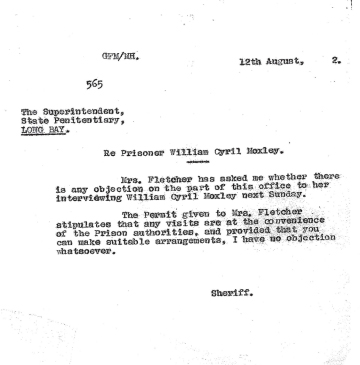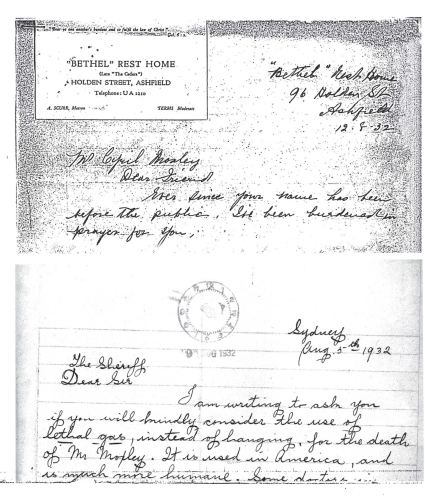Mad Dog Moxley (14 page)
Authors: Peter Corris
THE WAITING
â¦if you would care to come
and see me I would like to see you
as we were not enemies for the
last two yearâ¦
MOXlEY TO MACKAY, 12 AUGUST 1932
After a reportedly long discussion, the State Cabinet, meeting on 3 August, decided unanimously that the sentence of death on William Cyril Moxley be carried out. The Executive Council, meeting later, fixed the date for 17 August. A newspaper report stated that âIn arriving at the decision the ministers would not be influenced by the fact that Moxley had asked that the death sentence be carried out.' No confirmation of this request has been found. Certain aspects of Moxley's behaviour suggest that he had resigned himself to his fate.
Sixteen men had been executed in New South Wales in the 20th century to 1932. There had been many commutations and, generally speaking, the death sentence was carried out on those found guilty of murdering women, children or policemen. There had been no executions since 1924, when William George Campbell was hanged for killing a policeman and a civilian. A majority of the Australian population was firmly in support of capital punishment. A public opinion poll carried out in 1941 showed support at 57 per cent, with 33 per cent opposed and 15 per cent undecided.
The Lang Labor government, which had been in power for most of the period 1924 to 1932, had routinely commuted death sentences. Labor was replaced in May 1932 by a conservative United Australia Party administration headed by Bertram Sydney Barnsdale Stevens. Coming to power on a policy of law and order, concerned about the volatility of the masses of unemployed and aware of public feeling against Moxley, Stevens and his colleagues were unlikely to waive the death sentence. Stevens was a hardline Methodist, a teetotaller and non-smoker, unsympathetic to weakness in others. He was also, at least at first, anxious to mark his government off from that of Lang.
Although the public had been inflamed by âMad Dog Moxley' headlines and had demonstrated their hostility at Moxley's hearings, there were still those who opposed capital punishment. The Howard League for Penal Reform, named after an 18th-century English campaigner for the humane treatment and rehabilitation of offenders, had active branches in Australia from the mid-19th century. The league opposed the death penalty as an article of faith and consistently campaigned against it. The Sydney branch petitioned the premier to reprieve Moxley. Stevens said that the Cabinet decision had been unanimous but that he subsequently approached the ministers, ânone of whom saw any reason to alter the original decision'.
While awaiting trial and the results of the appeal, Moxley was allowed materials and tools. At one time he had given his occupation as carpenter and he evidently had some skills in this field. The large and elaborate cabinet he constructed in the prison workshop he gave to William MacKay. MacKay later became Commissioner of Police and the cabinet stood in the office of the person holding that post for many years.
The unusual relationship between Moxley and MacKay is underlined by a letter the condemned man wrote to the police officer on 12 August:
Dear Mr McKay
Just a line to say that if you would care to come and see me I would like to see you as we were not enemies for the last two years you did me a good turn or to and I will always remember your kind actions if you care to come and see me before the last well it is OK with me if you cannot well I know it is for some other reason but you have my wish and will be pleased to see me if you come hoping you are well.
Yours sincerely W Moxley
Â
The sheriff, whose duty it was to advise Moxley of the date of his execution, wrote to the Comptroller-General of Prisons requesting that âevery facility' be given to MacKay for his visit. It is not known how long the visit lasted or what the men talked about.
Moxley also received visits from Linda Fletcher and his young son, Douglas. No physical contact was permitted on these visits. A gaol official recorded that Moxley, after drawing a deep breath, received his son's visit with stoic calm.
The impending execution continued to receive attention in the press and to arouse public concern. The Comptroller-General of Prisons received a letter from a woman whose religious conviction had been touched by Moxley's plight.


THE SHERIFF' LETTERS REGARDING VISITORS TO MOXLEY IN LONG BAY 12 AUGUST 1932

LETTERS FROM TWO CONCERNED CITIZENS, I.UGUST 1932
Â
âBethel' Rest Home
96 Holden St
Ashfield
12.8.32
Mr Hinchie
Controller General of Prisons
Sydney
Dear Sir
Ever since the arrest of Cyril Moxley I've been burdened in prayer for this most precious soul.
I had intended writing to you to ask for a personal interview, but learned from my friend and co-worker (Mrs Bull) that an interview had been refused.
Will you grant me this favour and have the enclosed letter forwarded to the condemned man.
If you want to know anything about me I was at one time Matron of the Sydney Night Refuge for Women, connected with Mrs George Ardill's mission work and during that time I had free access to the city courts, and also Long Bay Prison.
I can only pray that God may be pleased to honour this frail effort to reach this poor man, e'r'e it is too late.
Thanking you in anticipation.
Yrs in the Masters Service
Ann Scurr
Â
Ann Scurr's letter to Moxley was enclosed together with a card that read:
Bear ye one another's burdens and fulfil the love of Christ(Gal. 6:2).
Â
âBethel' Rest Home
(late âThe Cedars')
96 Holden Street, Ashfield
Telephone: UA1210 12.8.32
Mr Cyril Moxley
Dear Friend
Ever since your name has been before the public, I've been burdened in prayer for you.
I do not remember ever having seen you on any previous occasion, but this is the priviledge [
sic
] God gives us all unworthy as we are, of his least favour. Yet He allows us to hear people up before his throne of Grace.
Have you sought that throne of Grace. Oh Christ is such a tender loving Saviour, that willeth not the Death of any sinner, but longs that they would look unto Him and live.
Did he not say
I
if
I
be lifted up will draw all men unto
me
.
Will you not forget the world that condemns you, and the Sin that caused such ruin in your life and look unto Him and be Saved who said
Come unto me
and all
ye
that labour and are heavy laden. Leaning on that promise will you not go to Him, and cast yourself upon His overwhelming love and mercy and claim the pardon who said Tho all your Sins be as Scarlet they will be a white as wool, Though they be red like Crimson they shall be as white as snow.
*
Oh hear the Christ who died to redeem you, to reveal Himself to you today that will fall at his feet, and claim the pardon so freely He offers you.
I will continue to pray that you will one day meet me in the glory not by works of rightousness which we have done, but by His Sovereign Grace He saves me (could be âus').
Yrs thro that Sovereign Grace Ann Scurr
Â
Religious tracts with an emphasis on redemption and the forgiveness of sins were delivered to the gaol and presumably passed on to Moxley.

The sheriff received an anonymous letter from a writer more concerned with the manner of Moxley's death than his soul:
Sydney
Aug. 5th 1932
The Sheriff
Dear Sir
I am writing to ask you if you will kindly consider the use of lethal gas, instead of hanging, for the death of Mr Moxley. It is used in America and is much more humane. Some doctors in America state that after observation they came to the conclusion although the neck is broken by hanging, the person does not die until a short time after, and the spasmodic contortions & contractions of the muscles so nauseating to those assisting. Some of these have fainted, and also through nervousness, the operator has several times bungled his part, with disastrous results. Lethal gas prevents all this. It is very swiftly administered with a face mask in some cases attached to the gas bag or cylinder. The prisoner passes quietly into a painless sleep, sometimes saying his prayers. The RSPCA uses it for disposing of pets, stray animals, cats, dogs etc. and in this scientific and enlightened era we should be at least as considerate to human beings.
Yours truly
Student (Golden Rule)
Â
Not all authorities agreed at the time that gas was a more humane method of execution and its use was never considered in Australia.

With the failure of the appeal and refusal of pleas for clemency, the time for visits and letters and tracts was over and the final procedure began. Moxley was taken to the observation section of Long Bay Gaol, a well-lit area where he could be kept constantly under guard. He would remain there until conducted to the condemned cell about one hour before the time appointed for the execution: 18 August (why an extra day was added is not clear) at 8.30 am.
*
The quotation should read: âThough your sins are like scarlet, they shall be as white as snow; though they are red like crimson, they shall be as wool.' (Isaiah 1.18)